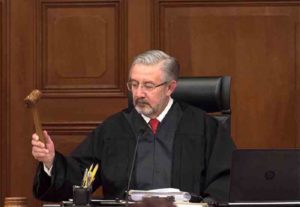
06 Sep How do we do this?
There is a practice in some of the courts where I have worked, in which the judge will call several defendants at the same time for proceedings like initial appearances, arraignments, or guilty plea hearings, each one having a different case. Sometimes they all need an interpreter, but sometimes there’s one, or a few, who do not. I have struggled with this, as I’m sure many of you have, too. I’m going to tell you how I handle those situations, and you tell me what you think and how you handle it. Maybe, together, we can find a good solution.
I interpret for those in the group who do need an interpreter, using simultaneous interpreting equipment, of course. But when the judge is addressing one of the defendants in the group who does not need the interpreter, I tell the non-English speakers who are not part of the case, over my microphone: “This defendant speaks English, so he does not need an interpreter.” And then I stop interpreting until the next case is called for which my services are needed. Some colleagues tell me that if they could understand English, they would be hearing what the judge is saying to the English-speaking defendants. On the other hand, the English-speaking defendants are not hearing what the LEP defendants are hearing, which is my voice telling them in Spanish what the judge is saying. Is there a difference? Some hear everything in Spanish (which is my language), some hear everything in English.
 Now, the purpose of an interpreter in a courtroom is for the LEP defendants to hear and understand everything that is happening in their case, not in someone else’s case. For example, if the judge addresses an attorney walking in late for some other client, and whatever the judge is saying does not concern the LEP defendant for whom I am interpreting, I simply inform him or her: “The judge is talking to an attorney about another case, not yours.” And, of course, I do not interpret whatever the judge is telling that attorney. I don’t want the defendants wondering if there is something going on that they should know about, but I also don’t want to be interpreting something for them that is not directly related to their cases. Of course, if there are several defendants called in the same case and some speak English and others don’t, the non-English speakers still have a right to hear everything, even if the judge is addressing one of the English-speaking defendants.
Now, the purpose of an interpreter in a courtroom is for the LEP defendants to hear and understand everything that is happening in their case, not in someone else’s case. For example, if the judge addresses an attorney walking in late for some other client, and whatever the judge is saying does not concern the LEP defendant for whom I am interpreting, I simply inform him or her: “The judge is talking to an attorney about another case, not yours.” And, of course, I do not interpret whatever the judge is telling that attorney. I don’t want the defendants wondering if there is something going on that they should know about, but I also don’t want to be interpreting something for them that is not directly related to their cases. Of course, if there are several defendants called in the same case and some speak English and others don’t, the non-English speakers still have a right to hear everything, even if the judge is addressing one of the English-speaking defendants.
Then there’s the monkey wrench: after addressing an English-speaking defendant, the judge will turn to the non-English speaker and say, “you heard what I just said…”. I did not interpret what the judge just said, so what now? If the defendant has no idea what the judge just said, I will address the judge: “Your Honor, the prior defendant understood English and did not require the services of the interpreter, so this defendant did not hear what you just said.” If and when that happens, the judge will simply repeat for the LEP defendant’s benefit. I also see it as a way of reminding the judge that these are individuals who are going through a legal proceeding that may be routine for the judge but is not routine for the defendant.
I believe that even when proceedings are conducted en masse, they should be handled as if each one were being conducted individually. If the court were to call each one separately, we would be interpreting only for the one defendant standing in front of the judge. Even if there are LEP defendants present in the courtroom, maybe sitting in the back waiting for their case to be called, I still would interpret only for the one standing in front of the judge who needs my services. I would not be interpreting whatever is happening during the English-speaking defendant’s proceeding just for the benefit of others in the courtroom who do not speak English.
 The case law is clear: the interpreter is there for the LEP defendant to hear and understand everything that is going on in their case, not in other people’s cases. Whether or not the English speakers can hear what the judge is telling everyone else, the appellate courts have said that LEP defendants should hear and understand in their case what an English speaker would hear and understand. To me, that means that nothing pertinent to the LEP defendant’s case can be left out, not that we add to the target language rendition whatever happens in a courtroom that is not pertinent to the LEP defendant’s case.
The case law is clear: the interpreter is there for the LEP defendant to hear and understand everything that is going on in their case, not in other people’s cases. Whether or not the English speakers can hear what the judge is telling everyone else, the appellate courts have said that LEP defendants should hear and understand in their case what an English speaker would hear and understand. To me, that means that nothing pertinent to the LEP defendant’s case can be left out, not that we add to the target language rendition whatever happens in a courtroom that is not pertinent to the LEP defendant’s case.
What do you think? How do you handle those massive proceedings with LEP and English-speaking defendants all mixed together? Leave your comments below.

Janis Palma has been a federally certified English<>Spanish judiciary interpreter since 1981. Her experience includes conference work in the private sector and seminar interpreting for the U.S. State Department. She has been a consultant for various higher education institutions, professional associations, and government agencies on judiciary interpreting and translating issues. She worked as an independent contractor for over twenty years in federal, state, and immigration courts around the U.S. before taking a full-time job. Janis joined the U.S. District Courts in Puerto Rico as a staff interpreter in April 2002 and retired in 2017. She now lives in San Antonio, Texas, embracing the joys of being a grandmother. She also enjoys volunteering for her professional associations, has been on the SSTI and TAJIT Boards, and is currently the past Chair of the NAJIT Board of Directors. Contact: palmajanis88@gmail.com
Featured image (cropped) from “Por la revitalización de las lenguas originarias como un derecho humano” by Alfredo Seguel at Indymedia Argentina, under a CC BY-SA 4.0 license. Text body photos: “Ministro Luis María Aguilar” from “Un juez calderonista propone declarar anticonstitucional la consulta para juicio a expresidentes; AMLO responde” at Rubén Lenguas ENTRE NOTICIAS, under a CC BY 3.0 license; “Understand Me” by Juan Carlos at DIGA LO QUE SEA, under a CC BY-NC-SA 3.0 ES license.

Here in Greenville County General Sessions Court (Criminal Circuit Court), some cases are called en masse. If the case were called individually, I would only interpret for the LEP parties. Further, many LEP parties are unfamiliar with courtroom proceedings. I choose to interpret only what applies to the LEP parties’ case(s). Otherwise, these individuals may become confused, creating unnecessary dialog between the LEP parties and interpreters or the judge.
That is a good point, Emily! If you start interpreting everything that is happening around them, it will probably confuse them (perhaps even more than they already are.) Thank you!
Exactly! I used to take that approach when I first started interpreting, then realized it results in increased confusion. In some cases where I’ve felt it necessary or the person was looking to me for something, I have said simply “one moment, there is a conversation regarding another case.”
Yes, they are lost without the information we can provide, so a little “stage direction” goes a long way. Thank you, Andreea.
I agree 100%.
Here’s some other situations. I regularly interpret some traffic dockets in which there are several LEP defendants on one docket (but they are not heard en masse). I have 8 receivers so I can usually put simultaneously equipment on all of them so that they may hear the judge’s announcement about their rights at the beginning of the court session or any other announcements that are for the whole audience. Then if they wish to, they can turn their receivers on and listen to each of the other LEP defendants’ cases before the judge. I find that some of the rights questions go more smoothly for the last few cases and I believe that’s because they were listening to the previous cases. Of course, I always make sure my mic is off for attorney/client conversations. To remember I actually take my headset off and hang it on my arm just to make sure and to let the parties know I’m not transmitting.
Another scenario is responsibility court, like DUI court. In that case I interpret the entire session even other “cases”. The first half of the session has encouraging comments from the judge and treatment providers along with announcements about scheduling and current events/problems. They also give out rewards and commendations to different individuals. Some individual participants might speak about their experiences. They also have “graduations’. So, the LEP participants need to hear all of it. That takes place in an assembly room and everyone must attend that portion. The 2nd half is moved to a courtroom where sanctions are dealt out for any failures to comply. New LEP participants are required to attend that portion on their first appointment in the program so that they may see how the sanctions work. So those “English” cases must be interpreted to them.
Very interesting, Michelle! I like the trick about placing the transmitter/microphone on your sleeve or somewhere where it provides a clear and visible signal that you are NOT interpreting. About the DUI court, it sounds more like a presentation to an “auditorium,” so it makes perfect sense to interpret everything for everyone. We each have to assess the situation in front of us because what you describe is something I have never encountered but I’m pretty sure I would approach it the way you describe. Thank you!
I subscribe to the school of thought that posits that the responsibility of the interpreter is to place the LEP person(s) being interpreter for in the same position as if there were no language barrier. The principle here is equal access, an equally significant legal doctrine. I maintain that the interpreter should interpret into the LEP’s language everything that would be heard by anyone standing or sitting in that spot. That way the LEP party is really present in court, hearing what’s going on and enable to be fully present. This is a good way for some to become more familiar with how courts work, see how other people are treated, perhaps think further how to respond or how not to respond, etc. I’m just not fond of interpreters deciding what’s important to be interpreter and what’s not–everything should be interpreted to make the LEP person fully present.
Yes, I totally get where you’re coming from, Robert Joe. I realize that there is an element of mistrust regarding an interpreter’s capacity to make judgment calls on his/her own. That could/would be solved if the training and education of court interpreters prepared them to make those decisions, instead of keeping them at this lower level of training that focuses only on basic consecutive, simultaneous and sight translation techniques, legal terminology, and “repeating everything you hear,” as if languages were mathematical equations. There is so much that goes into the production and perception of meaning in one language, let alone two, that it is a disservice to the courts, the LEP individuals, and the interpreters, not to raise the bar so they ARE well prepared to make those sorts of judgment calls. Thank you for your input, as always.